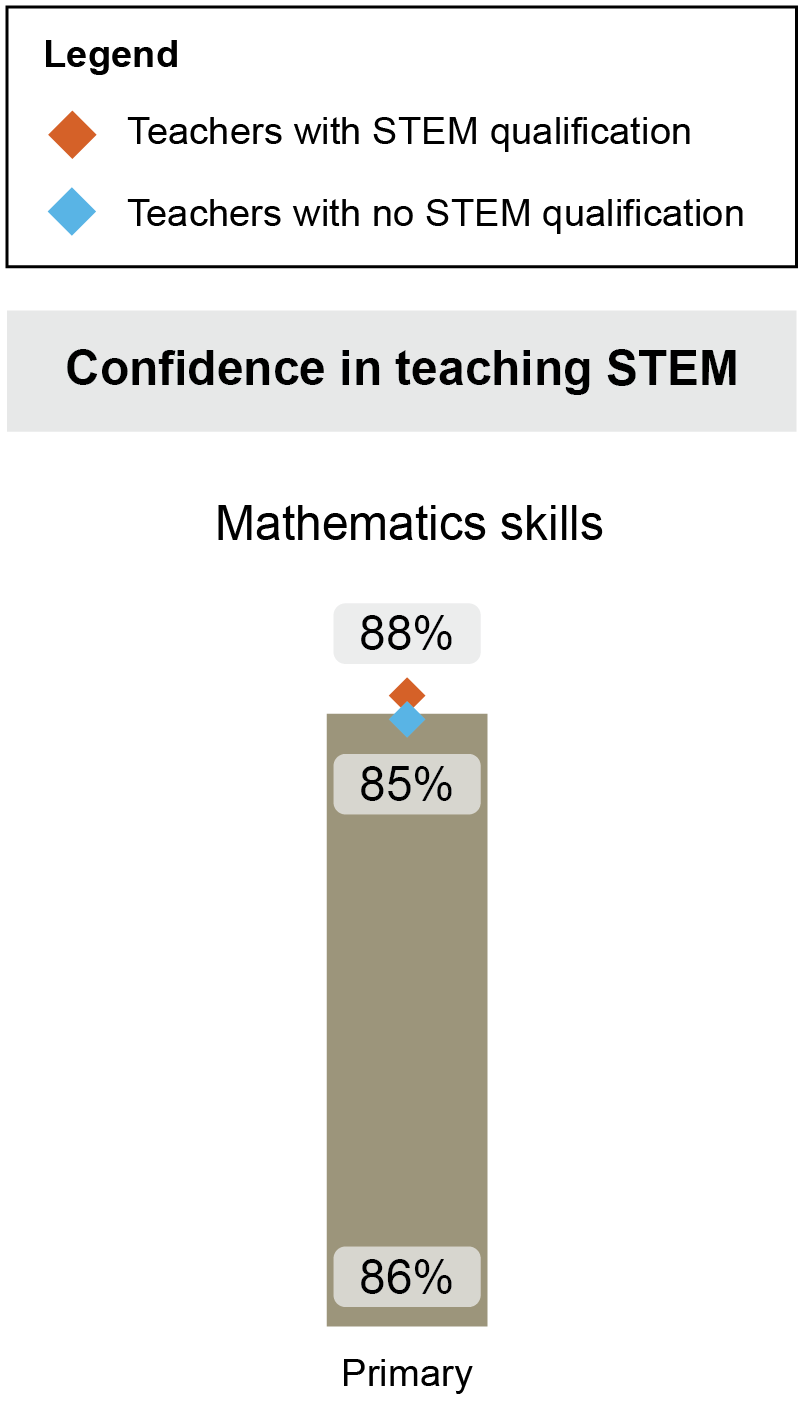Data insights
Men educators across all teaching settings (primary, secondary, and tertiary) were more likely to have a STEM qualification than women educators (60%, compared to 36%). Secondary teachers of STEM subjects were more likely to have a STEM qualification than those who do not teach STEM subjects (69%, compared to 26%). Among teachers of STEM subjects across all teaching settings, 39% did not have STEM qualifications.
STEM importance
98% of all educators, regardless of whether they teach STEM subjects or not, agreed that STEM skills are important for the Australian economy. 89% also thought these skills will help give job security for future workers. These results have no statistically significant differences to the previous educators survey (2020–21).
Most educators saw STEM as an integrated set of skills, with all 4 STEM areas important for getting a good job. These results are similar to the 2020–21 survey outcomes.
- 58% said technology skills are very important
- 48% said mathematics skills are very important
- 33% said science skills are very important
- 22% said engineering skills are very important.
The response scale for the data above included 5 options. In order from most to least favourable, these were:
- very important
- somewhat important
- neither
- somewhat unimportant
- not at all important.
Primary teachers placed significantly more importance on technology skills than secondary teachers (64%, compared to 50%). This was the same for mathematics skills (53% of primary teachers, compared to 42% of secondary teachers). These differences also appeared in the previous survey.
Teachers with STEM qualifications were significantly more likely to identify STEM skills as very important to getting a good job. 54% of these teachers said integrated STEM skills are very important, compared to 35% of those without STEM qualifications.
These significant differences were reflected for each individual skillset except technology. Of educators with STEM qualifications, 62% agreed technology skills are very important to get a good job in the future. This is only slightly higher than the 55% of educators without STEM qualifications who agreed. These results were consistent with the previous survey.
Confidence in teaching STEM
For educators across all teaching settings, 90% of men felt qualified to teach at least one STEM topic, compared to 83% of women. Across all teaching settings and STEM subject areas, educators felt least qualified to teach engineering, with only 30% saying they feel qualified to teach this subject.
A significantly higher proportion of women than men reported no confidence in teaching STEM subjects (16%, compared to 3%). This result may be impacted by a greater proportion of men educators in the population sample having a STEM qualification and teaching STEM compared to women.
Educators with STEM qualifications were more confident teaching STEM subjects than educators without STEM qualifications. For STEM as an integrated set of skills:
- 79% of primary teachers with STEM qualifications felt confident to teach STEM as an integrated set of skills compared to 59% without STEM qualifications
- 81% of secondary teachers with STEM qualifications felt confident compared to 36% without
- 72% of tertiary teachers with STEM qualifications felt confident compared to 32% without.
Capacity to give STEM career advice
Among those who provide career advice to students, 53% rated their ability to provide students with advice on STEM pathways as high or very high. A further 34% rated their ability as medium, while 12% rated their ability as low or very low. These results were similar across men (53% high or very high) and women educators (52% high or very high).
Educators were also asked to rate their ability to explain what different STEM careers involve. 26% of educators rated their ability to explain different STEM careers as high or very high. A higher proportion of men (44%) than women (23%) rated their ability as high or very high. Teachers with STEM qualifications (42%) were also more likely to say they can explain STEM careers than those without STEM qualifications (16%). These results may reflect the higher proportion of STEM teachers and teachers with STEM qualifications who are men.
75% of teachers felt confident connecting STEM content with real-world applications and career examples. Teachers with STEM qualifications were significantly more likely to feel confident compared to those who do not have STEM qualifications (90%, compared to 66%). A significantly higher proportion of secondary teachers (83%) felt confident making STEM connections compared to primary teachers (71%). While a higher proportion of men (84%) than women (74%) felt confident, this difference was not significant.

